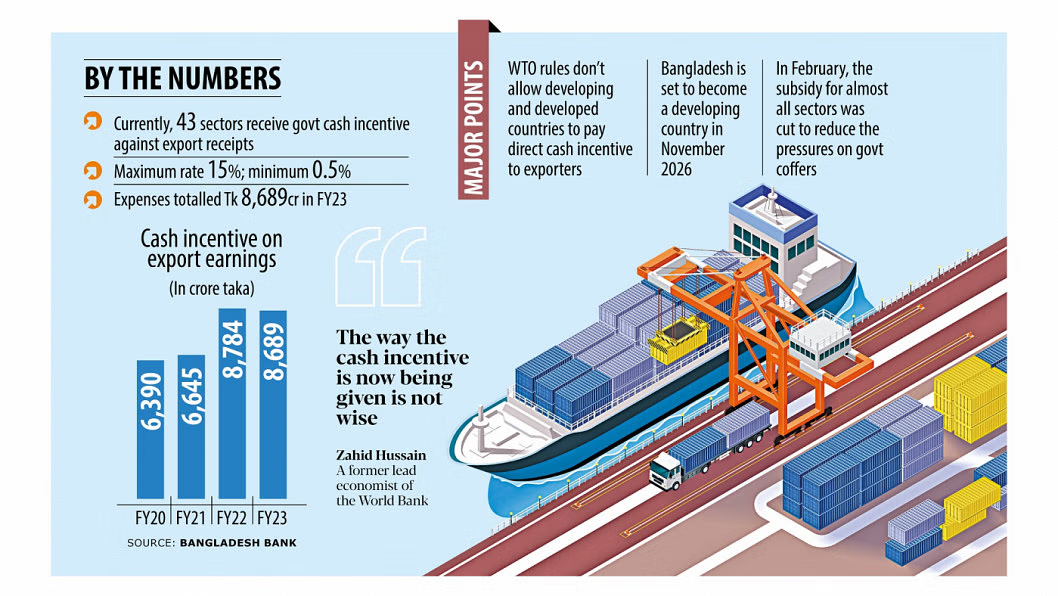Experts are critical of apparel manufacturers’ demand for cash incentives against their exports as they think that the financial support for the sector should be target-specific, not overall. Apparel manufacturers have called for 5% cash incentives against their exports regardless of destinations as they mention that the industry is passing through a critical juncture.The exporters cite rising production costs caused by new wage structure implementation and safety standard improvement.But experts are in favour of dealing the issue in an alternative way and raise question as to if or not the sector needs cash incentives after its 35-year journey. Also the question if the sector needs fiscal incentives in general or for a section of apparel makers who are going through crisis because of remediation process and lack of funds for improving the standards in the workplace remains. Dhaka Tribune has talked to economists as well as the sector people on the debate of cash incentives. “The present context of the apparel sector is different from the previous one. In the last five years, production cost went up by 29.54% and wages by 184%, while the prices of goods fell by 5% in US and in Europe by 4% but the workers’ productivity remains at 40%,” BGMEA president Rubana Huq mentions. “As a single sector, the apparel sector is employing the highest number of people and adding more to the economy in many ways contributing over 83% to national exports. So, considering the present critical situation, there is nothing wrong with the demand for a 5% cash incentives for all export destinations,” Rubana argues. Currently, apparel exporters enjoy 4% cash incentives against exports only to non-traditional markets, she says, explaining that providing a 5% cash incentives for all export destinations will cost Tk11,724 crore more over the existing amount. During 2013-2017 period, Bangladesh registered a 5.70% export growth, while its competitors Cambodia saw 9.38% and Vietnam 11.75% growth. So for boosting the sector’s performance, it needs both fiscal and policy support to achieve the $50 billion export target by 2021, exporters say.Economists, however, are of the opinion that the sector does not need cash incentives in general, rather it should focus on specific targets.“BGMEA should come out of the traditional incentive structure and focus on target-specific issues for better future and transition to new era. However, incentives for exploring new markets should continue,” Centre for Policy Dialogue research director Khondaker Golam Moazzem tells Dhaka Tribune. Incentives can be given in new areas such as technological development, enhancing skills of women, developing managerial capacity of BGMEA and products diversification, the economist says.Since the government is giving importance to product diversification, it should think about the other exports-oriented sectors, Moazzem suggests.He argues that if the government gives more concentration and incentives to a single sector, it may discourage other sectors.Exporters Association of Bangladesh (EAB) president Abdus Salam Murshedy, however, thinks that incentives should be given to all the emerging and potential export sectors to expand the sector basket as well as the volume.He backs the demands of BGMEA, saying that the sector is facing price competitiveness in the global market due to rise in production cost. Ahsan H Mansur, executive director of Policy Research Institute (PRI) says that instead of giving more cash incentives and tax rebate to the apparel exporters, the government should devalue taka or should change the exchange policy, which will help the sector.As Bangladesh is mostly producing basic items, he says, incentives can be given for some selective items such as lingerie and high value added items to encourage value addition and earn more.On top of that, for the sake of the sector as well as the country’s economy, he suggests the government set target in giving incentives, which will pay back well. Former caretaker government adviser AB Mirza Azizul Islam suggests assessing impacts of cash incentives and set target for future export earnings.Instead of giving endless incentives, there should be a mechanism of assessing the outcome from fiscal incentives and more importance should be given to emerging sectors as well as products to enlarge products baskets, he says.
RMG BANGLADESH NEWS
A Knowledge-based Initiative of Best Sourcing
Ready Made Garments sector is the key source of foreign currency and GDP for Bangladesh. Approximately 4.2 million people are dependent on the RMG sector for their bread and butter.
Ready Made Garments sector is the key source of foreign currency and GDP for Bangladesh. Approximately 4.2 million people are dependent on the RMG sector for their bread and butter.
Contact us: info@rmgcentre.com
© Copyright 2019 - RMG Bangladesh
















